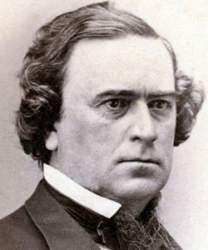Record Data
Source citation
William A. Barnes, History of the Thirty-Ninth Congress of the United States (New York: Harper and Brothers, 1868), 192-195.
Type
Speech
Date Certainty
Exact
Transcription date
Transcription
The following text is presented here in complete form, as it originally appeared in print. Spelling and typographical errors have been preserved as in the original.
I regard this bill as one of the most dangerous that was ever introduced into the Senate of the United States, or to which the attention of the American people was ever invited. During the last four or five years, I have sat in this chamber and witnessed the introduction of bills into this body which I thought obnoxious to many very grave and serious constitutional objections; but I have never, since I have been a member of the body, seen a bill so fraught with danger, so full of mischief, as the bill now under consideration.
I shall not follow the honorable Senator into a consideration of the manner in which slaves were treated in the Southern States, nor the privileges that have been denied to them by the laws of the States. I think the time for shedding tears over the poor slave has well nigh passed in this country. The tears which the honest white people of this country have been made to shed from the oppressive acts of this Government, in its various departments, during the last four years, call more loudly for my sympathies than those tears which have been shedding and dropping and dropping for the last twenty years in reference to the poor, oppressed slave dropping from the eyes of strong-minded women and weak-minded men, until, becoming a mighty flood, they have swept away, in their resistless force, every trace of constitutional liberty
in this country.
I suppose it is a foregone conclusion that this measure, as one of a series of measures, is to be passed through this Congress regardless of all consequences. But the day that the President of the United States places his approval and signature to that Freedmen's Bureau Bill, and to this bill, he will have signed two acts more dangerous to the liberty of his countrymen, more disastrous to the citizens of this country, than all the acts which have been passed from the foundation of the Government to the present hour; and if we on this side of the chamber manifest anxiety and interest in reference to these bills, and the questions involved in them, it is because, having known this population all our lives, knowing them in one hour of our infancy better than you gentlemen have known them all your lives, we feel compelled, by a sense of duty, earnestly and importunately, it may be, to appeal to the judgment of the American Senate, and to reach, if possible, the judgment of the great mass of the American people, and invoke their attention to the awful consequences involved in measures of this character. Sir, stop, stop ! the mangled, bleeding body of theConstitution of your country lies in your path; you are treading upon its bleeding body when you pass these laws....
Sir, from early boyhood I was taught to love and revere the Federal Union and those who made it. In early childhood I read the words of the Father of his country, in which he exhorted the people to cling to the union of these States as the palladium of liberty, and my young heart bounded with joy in reading the burning words of lofty patriotism. I was taught in infancy to admire, as far as the infant mind could admire, our free system ofgovernment, Federal and State; and I heard the old men say that the wit of man never devised a better or more lovely system of government. When I arrived at that age when I could study and reflect for myself, the teachings of childhood were approved by the judgment of the man.
I have seen how under this Union we had become great in the eyes of all nations ; and I see now, notwithstanding the horrible afflictions of war, if we can have wisdom in council and sincere purpose to subserve the good of the whole people of the United States, though much that was dear to us has been blasted as by the pestilence that walketh in darkness and the destruction that wasteth at noonday, how we might, in the providence of God, resume our former position among the nations of the earth, and command the respect of the whole civilized world. But, sir, to-day, in viewing and in considering this bill, the thought has occurred to me, how happy were the founders of our Federal system of government, that they had been taken from the council chambers of this nation and from among their fellow-men before bills of this character were seriously presented for legislative consideration. Happily for them, they sleep their last sleep, and
"How sleep the brave who sink to rest,
By all their country s wishes blest!
When Spring, with dewy fingers cold,
Returns to deck their hallowed mold,
She there shall dress a sweeter sod
Than Fancy's feet have ever trod.
"By fairy hands their knell is run
By forms unseen their dirge is sung;
There Honor comes, a pilgrim gray,
To bless the turf that wraps their clay;
And Freedom shall henceforth repair
And dwell a weeping hermit there."
Footnotes
Note: Sections of description of the bill omitted.


